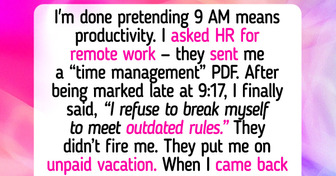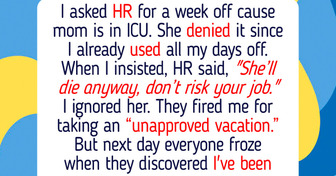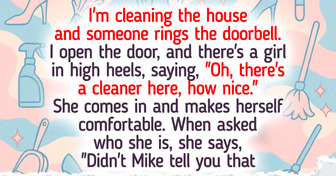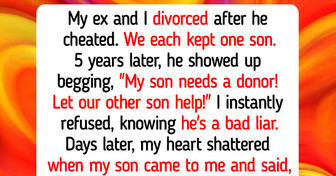I would file a complaint with HR siting a toxic work environment because people share all their plans with kids and spouses. Lol turn the tables.
I Said I Wanted to Stay Single, Suddenly HR Wants to See Me

A reader opened up about a moment at work that spiraled into something bigger—a remark about being single turned into complaints, cold shoulders, and gossip. His story shows how easily words can be twisted and why protecting your voice matters.
Hey, Bright Side,
Here is my story. At the office, everyone was sharing weekend plans with their families. They turned to me, I shrugged and said, “I’m single, happy, and I plan to stay that way.” The smiles faded, and suddenly the chat went flat. Days later, I was stunned when HR called me to say there had been “concerns about my hostile attitude toward marriage and family.” I laughed because I thought it was a joke. Nope. Someone had actually filed a complaint saying I was “creating an uncomfortable environment” by dismissing family values.
Then HR hit me with this wild suggestion: maybe I should “apologize to the team for being dismissive.” I refused. I said, “I didn’t insult anyone, I just said I’m single. That’s it.”
Now some coworkers are giving me the cold shoulder, acting like I attacked their lifestyle choices. One of them started a rumor that I’m bitter because I got divorced and lost custody of my kids, which is completely made up.
So now I’m sitting here wondering if I should actually apologize just to smooth things over, or if I should keep standing my ground. Like, is it not okay to say I’m single and not sugarcoat it? Why can’t I be happy if I don’t have anyone beside me?
Thank you for sharing your story. Seems that the reaction you got isn’t about your words but about how some colleagues interpreted them. Let’s see what you can do to protect yourself, address the rumors, and move forward without giving in to pressure to apologize for something you didn’t do.
First, clarify the record with HR
- Ask HR to document in writing exactly what part of your statement was considered “dismissive.”
- State clearly, also in writing, what you actually said. This ensures there’s a paper trail in case the issue escalates.
- Request that HR note in your file that the rumor about divorce and custody is false and defamatory.
Why do you need to do this: If HR has a complaint on record, you don’t want a vague or misquoted version of what you said sitting in your file. Having the exact wording documented protects you from future misrepresentation. If later you face performance reviews, promotion decisions, or even legal matters, written proof of your side keeps you from being cornered by “he said, she said.” Also, by officially asking HR to note that the divorce/custody story is false, you put the responsibility on them to acknowledge that the rumor is baseless. That way, it’s harder for anyone to use it against you later.
Address the situation and rumors
- Don’t apologize for your lifestyle choice, but do show you respect others. A neutral statement can help, like: “I just want to clear something up. When I said I’m single and happy that way, it wasn’t meant to put down anyone else’s choices. I respect that many of you have families, and that’s great. I was only speaking for myself.”
- Don’t ignore the rumors. Keep your statement factual, short, and without emotion. This makes you look professional and shuts down speculation. Try this: “I’ve heard there’s a rumor about me being divorced and losing custody of kids. That’s not true. Please don’t spread personal stories that are made up.”
Protect yourself
- Document every incident: dates, what was said, who was present. If the situation escalates, you’ll need records.
- If coworkers continue the cold shoulder or escalate gossip, log it and share with HR only if it becomes disruptive to your work.
The reality is you can’t control how every coworker reacts, but you can control how you respond. Correct the misinformation, put the facts on record, and move on.
Best,
Bright Side
Coming up, we’ll reveal the so-called Salt and Pepper Test—a subtle but surprising tactic companies use to judge job applicants—and how to make sure it doesn’t quietly cost you the role you’ve worked for.
Comments
Related Reads
I Asked My Colleague Not to Microwave Smelly Food in the Office, Now HR Got Involved

I Refuse to Be in the Office by 9 AM—I’m Burned Out, and HR’s Policies Are Stuck in the Past

11 Stories of Stepparents Who Chose Kindness Through Tough Times

I Was Fired for Taking Days Off During a Family Emergency

15+ Times an Unexpected Guest Turned an Ordinary Day Into a Scene Straight Out of a Movie

I Refuse to Return My Late Colleague’s Paycheck, Now His Widow Is Furious

22 Moments That Prove Quiet Kindness Can Work Real Miracles

17 Stories That Prove Kindness Isn’t Naive, It’s Courage in Disguise

15 Pets Who Made a Mess and Feel Absolutely No Shame

I Refuse to Forgive My Parents After They Took My Inheritance for Being Childless

I Refuse to Risk My Son’s Safety to Save My Ex’s Child

14 Dates That Started Like Movies but Ended Like Sitcoms



